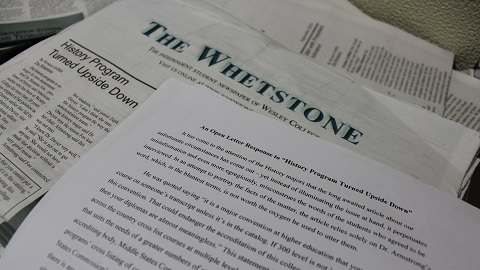By Kristen Griffith and Brittany Wilson (Whetstone Staff Writers)
Susan Bobby, associate professor of English, noticed two sheets of paper stapled to several issues the Whetstone, released the week of Nov. 3.
The pages were titled, “An Open Letter Response to ‘History Program Turned Upside Down,’†the name of the front-page article.
“My first thought was, ‘Why would there be a letter stapled to the newspaper that was not signed and attributed to no one in particular?’†she said.
In an apparent response to a Whetstone article about changes in the history program, including its move into political science under Dr. Anthony Armstrong, and the removal of Dr. Susanne Fox as Chair, an unsigned letter was stapled to more than two dozen issues of the Whetstone that contained the article.
No one who was contacted in the history program claimed to be the author or would comment or say who wrote the unsigned pages, despite the fact that the letter claimed that, “In summation, the whole Whetstone article has been rejected in full by the history students.â€
At first, Fox said she would talk about the pages, but later told a reporter, “I shouldn’t have said that. I’m really not allowed to say anything.â€
Whetstone adviser Victor Greto, an associate professor in media arts, said he was not happy when he found the letters stapled to the Whetstone only a day after the issue was printed.
“It upsets me as an adviser of students who work for weeks to get a story right, that someone can mutilate what those students do by simply writing an anonymous letter and stapling it to the newspaper,†he said. “They didn’t even have the guts to sign their names to it.â€
Bobby said the best way to handle a rebuttal is to write a letter to the editor.
“However, if a writer makes strong allegations against others in a letter and does not identify him or herself, this only makes his or her assertions questionable,†she said.
She said it was like writing an essay and not citing sources.
Senior John Wolgamot also suggested talking or writing to the editor if the reader has an issue.
“Get your voice out there and make your opinion known,†Wolgamot said. “Don’t hide behind an anonymous letter. That’s just cowardly.â€
He also said it was immature. “If you have an issue, talk to someone about it, don’t hide behind an ‘open letter’ with no signature.â€
Wolgamot said they basically called Dr. Anthony Armstrong, professor of political science, a liar.
“Actually I found most of it funny,†Armstrong said. “I had a few laughs.â€
Armstrong said he does not take the letter seriously because it was anonymous. He also said he will not comment about the personal insults contained in the letter.
“I will say there’s obvious confusion in the mind of the person who wrote it,†Armstrong said.
Armstrong said he does not have a problem with cross-listed courses like the letter suggests.
“My problem was having a course designation go on a student’s transcript when that designation is not in the catalog,†he said.
Armstrong found it humorous that the letter mentioned the 2006 Institutional Review.
“Only a couple of people would give it any credence, and one of them is in the history program,†he said.
Armstrong said it was interesting the letter also claimed that several statements in the article were false, including history student Nia Fortier’s statement that she had been told she could graduate with a museum studies minor.
“She told me that when I first met her,†Armstrong said.
He said Fortier also told Dr. Jeffrey Gibson, associate dean of curriculum and program development, the same thing.
She also told this to a Whetstone reporter.
“Due to the words, the tone, the arguments made, which I’ve heard expressed before, and especially the reference to the 2006 Institutional Review, I strongly suspect that Dr. Fox wrote it,†Armstrong said.





